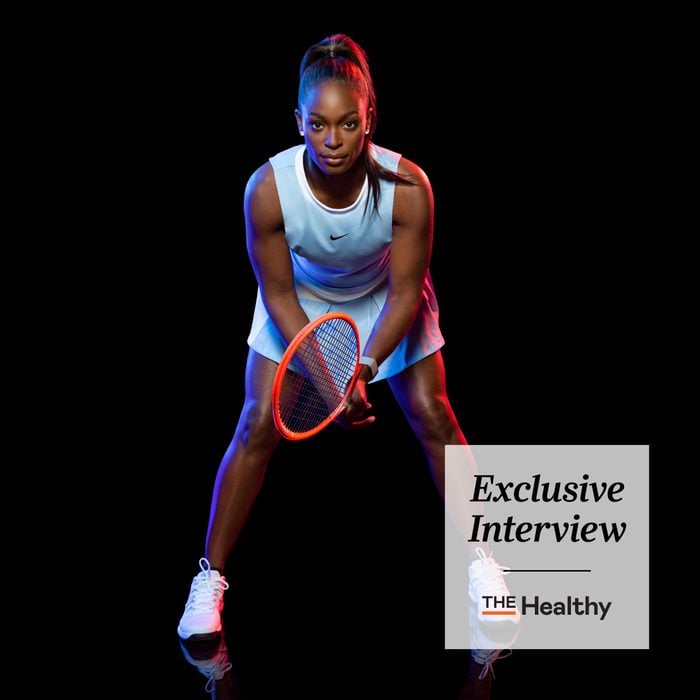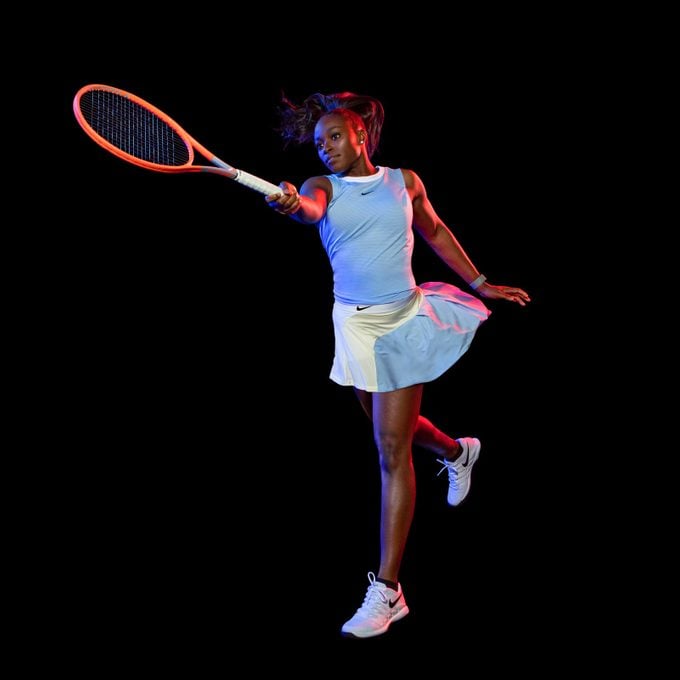Tennis Pro Sloane Stephens on Staying Positive and ‘Growing the Game’ Ahead of Wimbledon 2022
Updated: Jun. 24, 2022

As tennis superstar Sloane Stephens heads to Wimbledon 2022, she discusses managing her mental wellness, her best trick to staying loose in a tournament, and the work she's doing to make tennis more accessible. An exclusive with The Healthy @Reader's Digest.
Sloane Stephens, 29, has been playing tennis professionally for almost 13 years. Since she was 16, Stephens has earned accolade after accolade: scoring a major upset against Serena Williams; winning three Women’s Tennis Association (WTA) titles; and, after returning to the sport following a foot injury, winning WTA Comeback Player of the Year in 2017.
Managing a long athletic career of ups and downs from such a young age has taught Stephens not only how to take care of her body, but also how to maintain good mental health and stay resilient. Stephens spoke with The Healthy @Reader’s Digest about the importance of exercise, keeping her eye on the big picture, and her work with the Sloane Stephens Foundation.
Brooke Shields Exclusive: Her 4 Wellness Must-Haves and the “Extraordinary” Privilege of Aging
Sloane Stephens on wellness of mind + body
For Sloane Stephens, taking care of aches and pains isn’t the hard part of being a professional athlete. She told us her go-to fix, IcyHot, has been a solution in her family for years and is a regular part of her self-care routine. During tournaments, Stephens says she loves to use the patches on her back and shoulders while she sleeps to help her wake up feeling extra loose.
But the mental aspect of the game can be tricky…and after two years of a pandemic, no one—professional athletes included—is unaffected. Stephens says physical activity has helped her tackle that emotional exhaustion.
“I think exercise is a huge part of how we feel,” Stephens told The Healthy. “If I’m just at home being lazy, I try to go outside and go for a walk, I try to get up and do some stretching. It just makes me feel better in general and I think it’s an easy way to boost your mood. You don’t have to go for a 30-minute run. You can literally do yoga poses, you can do some stretching, you can do some things that are still getting yourself active to help with that mental fatigue that I think a lot of us feel, especially after COVID.”
Stephens has had to cultivate plenty of healthy ways to process the events around her. “I always say, you know tennis: one week you can lose the first round, the next week you can win the tournament,” she said. Managing that rollercoaster of wins and losses can be hard, but Stephens tries to keep her eye on the big picture.
How to Bounce Back Stronger from Your Most Embarrassing Mistakes
“There are so many things that can happen that can turn a season around, or a match around, that you have to have the mindset of being always ready to take advantage of whatever opportunities confront you,” she said. “I’ve been in that position. I’ve lost four first rounds in a row and then ended up going and making the quarterfinals at the French Open. There’s a lot to be said for people who are able to bounce back and take a terrible loss and turn it into something good. I think the people who manage that . . . have the better results.”
Overall, she says, her secret to resilience is simple. “I just try to stay positive. Obviously it’s not easy, but staying positive is the only way to get you through.”
How to Develop a Positive Attitude in 6 Easy Steps
The Sloane Stephens Foundation: Giving back

Whether it’s learning how to be positive, getting fit, or just finding community, Stephens knows the benefits sports can provide. That’s why in 2013 she started The Sloane Stephens Foundation, a non-profit which helps build tennis courts and start after-school tennis programs for underserved students.
Stephens says because tennis can be such a tough sport to break into, she wanted the Sloane Stephens Foundation to help lower that bar for entry so any kid can have the kind of opportunities she’s had. “Being able to teach tennis to people who normally wouldn’t be able to learn, or give kids the opportunity who normally wouldn’t be able to pick up a racket, that’s super important,” Stephens said.
“That’s building communities where maybe their kids will end up playing tennis. And for me, that’s what growing the game is. Obviously, playing tennis and being on TV every week is cool—but it’s not cool if kids aren’t picking up rackets because they just can’t. You want people to see you and say, ‘Oh, I want to play tennis,’ and then actually be able to go and get a tennis racket and ball and have somewhere to play.”
Get The Healthy @Reader’s Digest newsletter. Follow us on Facebook, Instagram, and Twitter, and keep reading:
